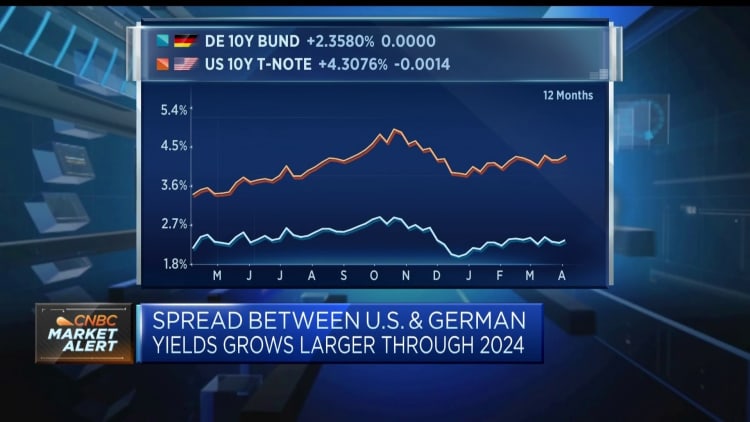Joachim Nagel, President of the Deutsche Bundesbank, during the central bank’s press conference on the “Annual Report 2023” on Friday, February 23, 2024, in Frankfurt.
Bloomberg | Bloomberg | Getty Images
The Deutsche Bundesbank’s losses shot into the double-digit billions in 2023 due to the increased interest rates, meaning that it had to resort to all of its provisions in order to reach the break-even point.
The Bundesbank reported zero annual distributable profit on Friday after releasing 19.2 billion euros ($20.8 billion) in provisions for general risks and 2.4 billion euros from its reserves. This leaves almost 700 million euros in reserves, the central bank said.
Net interest income was negative for the first time in its 67-year history and fell by 17.9 billion euros to -13.9 billion euros compared to the previous year.
“We assume that the burdens will also be significant in the current year. They are likely to exceed the remaining reserves,” said Bundesbank President Joachim Nagel at a press conference.
The central bank will report a loss carryforward that will be offset by future profits, he said.
Nagel added: “The Bundesbank’s balance sheet is solid. The Bundesbank can bear the financial burden because its assets significantly exceed its obligations.”
The German central bank – and many of its competitors – have significant securities holdings that are exposed to interest rate risk, which has been significantly impacted by the European Central Bank’s unprecedented series of interest rate hikes.
On Thursday, the ECB posted its first annual loss since 2004 at 1.3 billion euros, although it also used its own risk provisions of 6.6 billion euros. This follows almost a decade of the euro zone central bank using financial stimulus, printing money and buying large amounts of government bonds to stimulate growth, which now require large payouts.
The Dutch central bank reported a loss of 3.5 billion euros for 2023 on Friday.
Central banks emphasize that annual gains and losses have no impact on their ability to implement monetary policy and control price stability. However, they are seen as a potential threat to credibility, particularly if a bailout becomes a risk, and they impact central banks’ payouts to other sources.

The Bundesbank has not made any payments to the federal budget for several years, it was said on Friday, and there will probably be no more payments for a “longer” period of time. Meanwhile, the ECB will not make any profit distributions to the national central banks of the euro zone for 2023.
Nagel further said on Friday that raising interest rates was the right way to curb high inflation and that the Governing Council could only consider rate cuts if it was convinced, based on the data, that inflation was returning to that level target value corresponds.
Regarding the weakening German economy, he said: “Our experts assume that the German economy will gradually regain its footing over the course of the year and set out on a growth path. The tailwind is likely to be, firstly, the foreign sales markets, and secondly, private consumption should benefit from an improvement in the purchasing power of households.”
Correction: The Bundesbank is 67 years old. An earlier version incorrectly stated the age.
Source link
2024-02-23 15:16:32
www.cnbc.com













